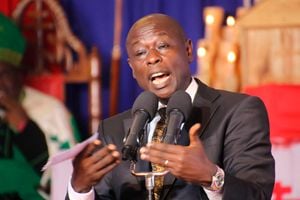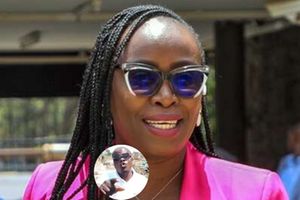Women and youth cry foul over party polls

Women MPs Joyce Laboso (right), Jebii Kilimo (centre) and Sophia Abdi Noor speak in protest over recent party elections in which women were denied top posts. Photo/PHOEBE OKALL
Kenya’s political landscape is grappling with a generational gap crisis as older politicians cling to leadership at the expense of more energetic and adventurous younger men and woman.
The political future of women and the youth remains unclear after they failed to clinch executive party positions during the recently-concluded elections of political parties.
The youth account for the majority of Kenya’s population but their leadership dreams remain a mirage as the old generation of politicians refuse to let go off leadership positions.
Despite the political parties elections being partly a fulfilment of the Political Parties Act requirement, pundits aver that it is an early arrangement for the presidential bid in 2012.
According to statistics, the youth account for the majority of Kenya’s population.
Grip on power
And with the youth hoping to be leaders of tomorrow, the question is who is to blame, between an older generation that wouldn’t relinquish its grip on power, and the younger lot that has kept out of competitive politics in favour of their careers.
As per the results of the recent party elections, no youth managed to clinch the top executive positions. And, save for Narc Kenya’s Martha Karua who is the party’s chairperson, women were equally given a raw deal in PNU, ODM and other leading parties.
In PNU, only Dagoretti MP Beth Mugo got the position of chairperson of Women’s Affairs. Gender Affairs minister Esther Murugi was denied the chance to vie for the vice-chairman’s post in favour of Mr Jimmy Angwenyi.
In ODM, no woman or youth was elected to the executive.
But the party has defended itself against accusations from women parliamentarians that the top leadership is not gender representative.
ODM chairman Henry Kosgey said on Tuesday that regional balance overtook the gender parity consideration during the elections last Thursday, but pointed out that out of the 56 posts, 25 went to women.
Women legislators from ODM and PNU on Monday discredited the recent appointment of officials in the two major parties saying women were not given their fair share.
Led by the Kenya Women Parliamentarians Association Chairperson, Jebii Kilimo, the women claimed the lists had been crafted secretly despite costly campaigns by the candidates.
“If we believe in sharing and equality, should there be canvassing? There should be democracy if they really recognise the role women play in their parties,” she said, adding:“We are calling on women to stop voting these men in.”
Sotik Member of Parliament Dr Joyce Laboso had on Monday appealed to the Registrar of Political Parties to critically scrutinise the lists of party leaders to ensure a third of the officials were women.
However the Registrar, Ms Lucy Ndung’u, says all the parties that had applied for registration had met the one- third requirement adding that the December 31 deadline still stands.
On his part ODM secretary-general Anyang’ Nyong’o said the women could make the seemingly inferior posts influential.
“It is important to give individuals the opportunity to be in the party executive whatever the post is and then for them to contribute to the building of the party. That is what will make history,” he said.
Political parties have until the end of this month to comply with the Political Parties Act and be registered by the Registrar of Political Parties.
The time for youth to take over leadership is yet to come in Kenya, according to former Kabete MP Paul Muite. For instance, President Kibaki incensed the youth after taking power when he stuffed his Cabinet and civil service with old, retired personalities that came to be known as the “grey-haired club”, Mr Muite says.
“The long-held dream that Kenyan politics would at one time be driven by young and educated personalities aged 40 and below remains a mirage, even as there is a growing consensus that the old generation is starving Kenyan politics of new and innovative ideas,” he says.
In his last years as Kenya’s second President, Mr Daniel arap Moi vowed to work with the young generation to give the country’s political landscape a face-lift.
He argued, while propping up Mr Uhuru Kenyatta to succeed him, that the old crop of politicians had over the years messed up politics and should pave the way for the young.
Mr Kenyatta and former Vice-President Musalia Mudavadi team, on the one hand, was the first serious attempt to push the youth into senior political leadership.
But, on the other hand, it was seen as Moi’s style of regional politics, besides the idea of cementing inheritance politics by some of Kenya’s prominent political families.
Cherangany MP Joshua Kutuny, one of the youthful legislators in the 10th Parliament, says these leaders, most of whom are now in their twilight years, have refused to give way for younger leaders, and still retain much influence.
“With this kind of political arrangement, the youth may not have a chance to lead this country soon,” he said.
Despite women MPs hitting a record in the current Parliament, their gender is yet to ascend to political supremacy in this land.
Earlier attempts by women to run for the presidency have proved hard as experienced both in 1992 and 1997 when Mrs Charity Ngilu and Nobel laureate Wangari Maathai respectively performed dismally despite women accounting for a larger percentage of voters in the country.




